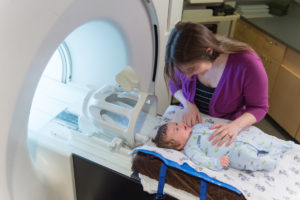In recent months, policies and conflict at the Mexico-United States border have led to the separation of thousands of children from their parents.
In a research brief for the Center on Immigration and Child Welfare, Center for Healthy Minds faculty member Julie Poehlmann-Tynan shares previous research related to children with incarcerated parents and draws parallels to the effects on the well-being of children who are separated from their parents at the border.

“Separation from parents is among the most potent stressors that a child can experience,” says Poehlmann-Tynan. “The adverse effects are exacerbated when separation occurs under frightening, sudden, chaotic or prolonged circumstances. Such separations increase children’s risk of developing depression, anxiety, posttraumatic stress symptoms and other trauma reactions.”
In the United States, more than 5 million children have a parent who is incarcerated, and families of color are disproportionately affected.
Poehlmann-Tynan and experts warn to not overlook the importance of caregivers in children’s lives. Caregivers help shape children’s developing brains by relieving stress on the nervous system and promoting new connections.
In the case of families with an incarcerated parent, not only are kids negatively affected, but also the situation can negatively affect the remaining parent. For example, the family may lose income from the incarcerated parent, placing a monetary strain on the family and also reducing the amount of time the primary caregiver can spend with the child.
“Separation from parents is among the most potent stressors that a child can experience. Such separations increase children’s risk of developing depression, anxiety, posttraumatic stress symptoms and other trauma reactions.”
In addition, negative effects from separation can reverberate into adolescence and adulthood, Poehlmann-Tynan says. Children with incarcerated parents are more likely to develop behavioral and academic issues, increased risk of drug and alcohol abuse, and long-term health issues.
Yet a few small changes in policy can have overwhelmingly positive impacts on children. For example, ensuring that children have strong, stable supports in their communities – whether it’s a coach, teacher or friend – is a significant protective factor. Regular visits between children and their incarcerated parents, especially face-to-face contact, are also helpful for children.
Like children with incarcerated parents, children separated from their parents at the border experience a sudden, traumatic separation from their parents or primary caregiver.
“When the constant dread of arrest, detention or deportation of parents culminates in actual family separation – whether short-lived or permanent – the results are particularly harmful and far-reaching for children’s well-being,” she says.
And instability in immigrant families is likely a familiar experience. Many immigrant families come from countries where they experienced war, famine, poor medical care and other traumatic experiences. As a result, children from immigrant families have experienced a wide range of traumas before being separated from their parents – all of which undoubtedly have negative impacts on their overall well-being.
To minimize harm to kids, Poehlmann-Tynan and other experts say it’s important to reunify families, as well as develop culturally-sensitive mental health services for the separated families.
-Brita Larson






